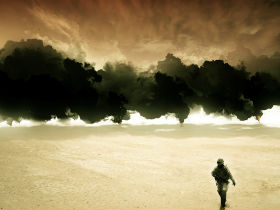saints and sinners of the stage and screen


saints and sinners of the stage and screen
Dying City
Upstairs at the Gatehouse
18th August 2014
★★☆☆☆

Photography provided by Wellington-Jones Productions
From the moment the audience enters and is greeted by a scene of a woman reading alone, on the floor of an otherwise comfortable apartment, we sense that we are in for a dark time. Although to be fair, Wellington-Jones Productions' new piece, Dying City, was hardly going to be a bag of laughs given the name alone.
As the play begins, we see Kelly (Emily Seale-Jones), a British psychotherapist with a deep sense of empathy for others being interrupted by an unexpected visit from Peter (Chris Wellington), an obviously gay actor living in New York. We learn that Peter is the brother of Craig, whose death in Iraq almost exactly one year ago left Kelly a young widow, who has seemingly been out of contact since she last saw Peter at Craig's funeral. Her discomfort at facing Peter drifts between focuses, sometimes she feels he has intruded unexpectedly, sometimes she recalls the awkwardness of the last time she saw him, sometimes she remembers the letter he sent asking her to bear a child, but this all ends in anger when he reveals that Craig was being unfaithful.
This current narrative is alternated with flashbacks of when Craig (also played by Wellington - the characters conveniently identical twins) was about to leave for Iraq for his last tour of duty. The tension in this scene draws on the revelations from the just-finished goodbye party. These take a long time to eventually coalesce into something vaguely meaningful, and even then the meaning twists and turns each time the scene is revisited. Eventually these two narratives spill into each other and we understand more about the overall reasons for the troubled minds of Craig and Peter. Between them, the brothers are somewhat scarred with an unhappy childhood and parents who saw more value in physical power and domineering behaviour than inner-happiness or self-control. Ultimately this bears out predictably badly for their interpersonal skills and relationships.
So far so good, perhaps, but the introduction of the political issues of the Iraq war, the obsession with George Dubya on the TV - front and centre of the stage throughout - and the 9/11 attacks in New York don't seem to fit into the shaping story of the characters or plot. The complexity of the war is only hinted at, and is unfortunately boiled down to a passing shot at the absurdity of the political posturing. The effects this conflict has had on our three protagonists is loose at best, only Craig has had to deal with it directly as a pair of boots on the ground. The knock-on effect of post-traumatic stress on Peter and Kelly is more related to the loss of Craig rather than the conflict that claimed him.
Writer Christopher Shinn tries to create a sense of layered complexity, slowly revealing each root cause for the messed-up behaviour of his characters. Yes, this layering does give a sense of getting somewhere, but the way it is revealed through disparate dialogues spanning three characters in two actors in two time frames - often interspersing other memories and emails from Craig's last days - seems an over-worked way of doing so. The ultimate effect is that the layers do not peel away cleanly, and we are not sure what each reveals on its own.
This is a shame, because the clever acting has the required subtlety to portray the hidden emotions of the characters whose lives are quite believable. We certainly feel sympathy for Kelly building as she discovers more and more dark secrets about her deceased husband.
Director Nancy Wallinger has tried to construct the arguments and confrontational scenes with the actors arguing over one another, but this is a trick that needs to be very strictly controlled, and there were one or two moments when this slipped. Caspar Hornak and Dipendra Gurung's set is well done, but the fact that props that were moved in the "present day" were still out of place in the flashbacks was disorienting. With the same actor in a different role already causing slight confusion, this was unhelpful.
Overall, the attempted complexity overwhelmed the play's intended message of dealing with grief, coming to terms with tragedy and the effects of war at home. The inclusion of so much irrelevant dialogue and tenuous connection to politics dilutes the real messages that are worth making. You won't be dying of boredom, but this is not a city you must visit.
Dying City ran from 16th to 19th August 2014 at Upstairs at the Gatehouse, as part of the Camden Fringe.
Nearest tube station: Highgate (Northern)